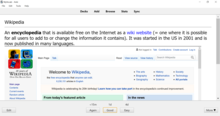 Anki 2.1.6 | |
| Developer(s) | Damien Elmes |
|---|---|
| Initial release | 5 October 2006 |
| Stable release | 24.06.3
/ 28 June 2024[1] |
| Repository | |
| Written in | Python, Rust |
| Operating system | Windows, macOS, Linux, FreeBSD; Android and iOS (special versions) |
| Available in | 48 (desktop)/14 (AnkiMobile) languages |
List of languages
| |
| Type | Flashcard spaced repetition |
| License |
|
| Website | https://apps.ankiweb.net/ |
Anki (US: /ˈɑːŋki/, UK: /ˈæŋki/; Japanese: [aŋki]) is a free and open-source flashcard program. It uses techniques from cognitive science such as active recall testing and spaced repetition to aid the user in memorization.[4][5] The name comes from the Japanese word for "memorization" (暗記).[6]
The SM-2 algorithm, created for SuperMemo in the late 1980s, has historically formed the basis of the spaced repetition methods employed in the program. Anki's implementation of the algorithm has been modified to allow priorities on cards and to show flashcards in order of their urgency. Anki 23.10+ also has a native implementation of the Free Spaced Repetition Scheduler (FSRS) algorithm, which allows for more optimal spacing of card repetitions.[7]
Anki is content-agnostic, the cards are presented using HTML and may include text, images, sounds, videos,[8] and LaTeX equations. The decks of cards, along with the user's statistics, are stored in the open SQLite format.
- ^ "Releases". GitHub. Retrieved 1 July 2024.
- ^ "LICENSE". Anki. Damien Elmes. 1 June 2020 – via GitHub.
- ^ "COPYING". GitHub. Retrieved 1 June 2020.
- ^ Shellenbarger, Sue (28 April 2015). "Flashcards Get Smarter So You Can, Too". Wall Street Journal. ISSN 0099-9660. Retrieved 6 October 2023.
- ^ Smolen, Paul; Zhang, Yili; Byrne, John H. (25 January 2016). "The right time to learn: mechanisms and optimization of spaced learning". Nature Reviews Neuroscience. 17 (2): 77–88. arXiv:1606.08370. Bibcode:2016arXiv160608370S. doi:10.1038/nrn.2015.18. PMC 5126970. PMID 26806627.
- ^ wikt:暗記
- ^ Cite error: The named reference
AnkiAlgoFAQwas invoked but never defined (see the help page). - ^ Played in a separate MPlayer window.